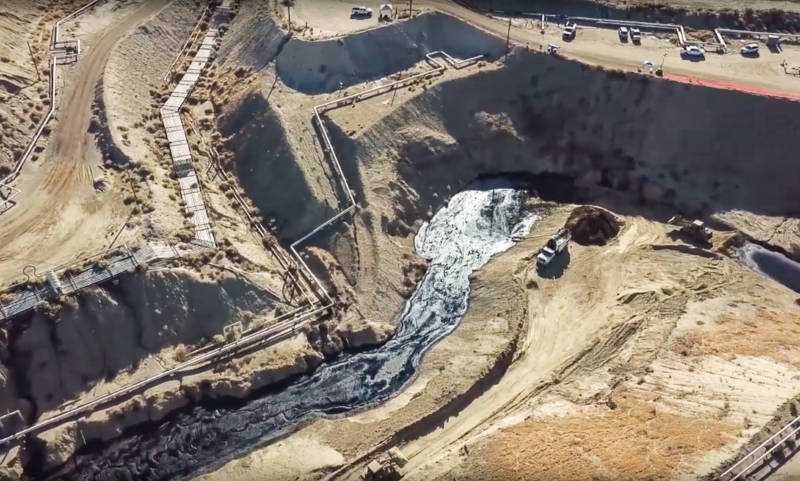Assemblywoman Laura Friedman (D-Burbank), who chairs the Assembly Committee on Natural Resources, said lawmakers should look into the current penalties for such leaks and determine if they are effective.
"For a company that reports quarterly profits in the billions, I question if a $2.7 million fine is sufficient enough to cause the operator to take all necessary steps to prevent these kinds of disasters," Friedman said in an email.
"The penalties associated with surface expression regulations and prohibitions are supposed to act as a deterrent for risky behavior," she said. "In addition to increasing penalties, we also need to look into what failed on the regulatory side of this issue and strengthen DOGGR's review process to ensure the formations are stable enough to withstand dangerous steam operations."
The two panels plan to conduct a joint legislative hearing about the spills in the Cymric oil field and DOGGR's work, most likely in December or January, according to Stern.
The leak at the center of DOGGR's fine, in an area designated 1Y, was first revealed by KQED. The incident began in May and led to the release of about 400,000 gallons of crude into a dry creek bed before finally stopping in August.
Since the new regulations went into place, the agency has also focused on two other significant spills in the Cymric Oil Field near the town of McKittrick. One involves surface expressions that have continued since 2003, releasing tens of millions of gallons of crude in an area called Gauge Setting 5, or GS-5. The other, dubbed 36W, is ongoing. That release began in late August and has spilled more than 184,000 gallons of oil.
Wednesday's order says the 1Y incident led to oil flowing out of the ground for 113 days, emptying crude into close to 42,000 square feet of a dry stream bed and creating "a significant threat of harm to human health and the environment."
California's Office of Spill Prevention says that two barn owls and a lesser nighthawk were found covered with oil at the scene of the spill and died.
"The oil flowing at the site was at a high temperature, producing steam, and could cause burns or ground instability, making the area around the surface expressions unsafe for humans. Oil flowing through an unlined channel presents potential impacts to soil, surface water, and wildlife," DOGGR's order states.
A Chevron spokeswoman says the company is reviewing the order and has collaborated with state agencies on hauling away the oil and contaminated soil.
"Chevron takes very seriously its responsibility to operate safety and in a manner that is protective of public health, the communities where we operate, and the environment. We have made significant progress working with Unified Command to clean up the impacted area, which is nearly complete," said Veronica Flores-Paniagua in an emailed statement.
"It remains our operational goal to prevent seeps consistent with DOGGR's updated regulations, and we continue to work closely with regulators to address any seeps that occur," Flores-Paniagua said.
Chevron had previously said that its crews' efforts to seal off a damaged and abandoned well are believed to have triggered the release.
DOGGR says Chevron will be able to sell more than 7,000 barrels, or some 300,00 gallons of oil recovered from the spill for about $400,000. The agency also says that for the last 13 years, Chevron's average annual revenue in California was $3.34 billion.
Two environmentalists who have followed Chevron's problems in the Cymric Oil Field described the penalty as a drop in the bucket for a multinational oil company with big pockets.
"People shell out more per gallon at the pump for this industry's product than the company will pay for this massive spill," said Hollin Kretzmann, a staff attorney at the Center for Biological Diversity.
"Oil companies should get more than a slap on the wrist for a million-gallon spill," Kretzmann said.
Gustavo Aguirre Jr., a Bakersfield project coordinator with the Central California Environmental Justice Network, agreed.
"For a company at the scale of Chevron, I know they can continue to do business as usual," Aguirre said.
But he applauded DOGGR, criticized in the past as being a weak regulator, for taking action, something that Ann Alexander, a senior attorney at the Natural Resources Defense Council, emphasized.
"DOGGR's significant penalty is a first step toward trying to prevent future spills," Alexander said. "The state now needs to follow up with not only better oversight, but also addressing the important transition away from the dirty, carbon-intensive crude production that risks these accidents," she said.
Chevron can appeal the state's fine. It's unclear if the company plans to challenge the penalty.
Sen. Stern said he believes Chevron wants to stop the leaks.
